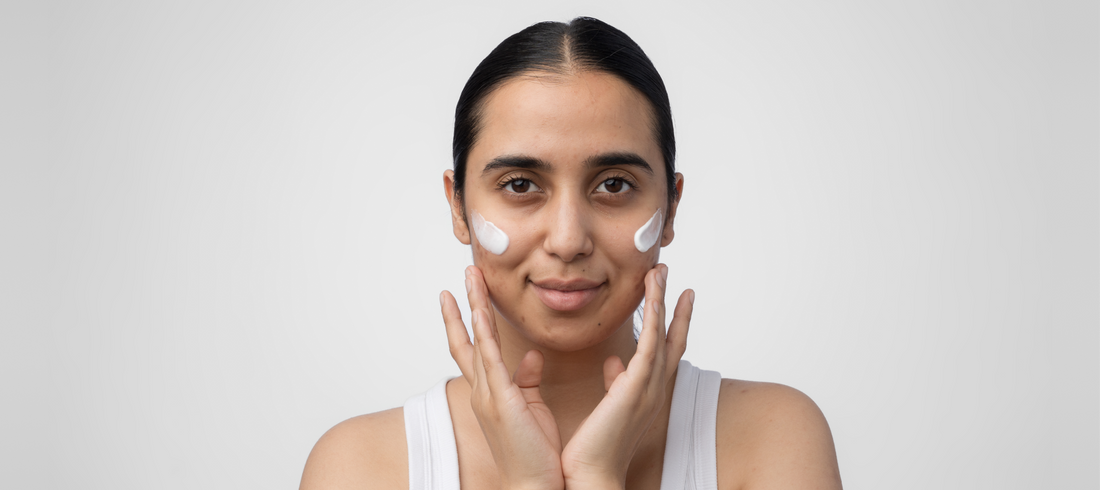From having to deal with undue shine on the face (that can be misunderstood for sweat) to having an orange-peel-like skin texture caused by the large pores, people with oily skin know the ordeal.
On the quest to find the best ways out of this ‘clog’, you must have tried multiple skincare products, but nothing works. And you know why? Because our dear products have a few ingredients that do not set well on oily skin.
To know the ingredients typically not meant for oily skin you don’t have to go through the jargon. We have curated a list of the top ingredients that should be kept away from your skin. Trust us, your skin will thank you!
What causes oily skin?
Whereas an appropriate amount of sebum (produced by sebaceous glands) keeps the skin hydrated and protected, its overproduction can cause the skin to look greasy and clog the pores. The reason for over-secretion could vary anywhere from genetics to hormones, climate, diet, and even stress.
Coming to the point, let’s get into the details of the ingredients that are a curse spell for your skin:
Ingredients to avoid if you have an oily skin
1. Comedogenic Oils
The biggest no no! Quite commonly used household ingredients like coconut, avocado, and olive oil are high in oleic acid, a fatty acid infamously known for clogging skin pores. This in turn leads to breakouts and greasiness on the face.
With a molecular structure that can easily get stuck in the pores, highly comedogenic products are not your best friend.
2. Alcohol-based products
Alcohol as an ingredient is used in two major types of products, cleansers and moisturisers.
Alcohol for the most part removes sebum (an oily content naturally produced by the skin to keep it hydrated) from your skin, but its overuse can leave the skin with no natural moisture. This can cause inflammation and irritation to the surface level, further leading to overcompensation of the lost oil.
To retain the natural oils and avoid irritants, it is recommended to use alcohol-free products on sensitive skin.
3. Harsh Scrubs
Exfoliation, when done right, can do wonders for oily skin, but harsh scrubs (some even containing nano-plastics) strip off the natural oils from the skin’s surface, leaving it vulnerable and causing inflammation, further resulting in breakouts and imbalance of the PH levels.
Harsh scrubs can create small tears in the skin allowing bacteria to make your face their habitat, that too rent-free. These tiny tears make it easy for the bacteria to breed and affect your skin in more ways than you think.
4. Silicones
Used to fill in the texture on the skin, silicone is an ingredient in products like primers and moisturisers. Even though it makes your skin look smoother and velvety, it creates a barrier coating on the surface.
It doesn’t allow other skincare (water-based) products used on top of it to absorb into your skin and also traps in the excess oil and dirt. For oily-skinned people, it is one big red flag!
5. Occlusive Ingredients
Petrolatum jelly, shea butter, beeswax, and jojoba oil are occlusive components used in many sunscreens, masks, and moisturisers.
The barrier they create on the skin is supposed to protect your skin from external elements like UV rays or pollution (which it surely does), but for oily skin, it also traps the oil and water from getting out and released from your face.
Which skincare ingredients are the most suitable for oily skin?
1. Salicylic Acid
Salicylic Acid is an oil-soluble beta-hydroxy acid (BHA) known to be a good peeling agent. As it controls the excess sebum production in the skin, it is the best for exfoliation.
It also reduces dilated pores and affects Cutibacterium acnes bacteria (a bacteria that lives deep in the follicles and pores).
2. Niacinamide
A form of water-soluble Vitamin B3, Niacinamide demonstrates anti-inflammatory effects on acne, making it one of the best ingredients for oily (acne-prone) skin. Its topical application has a positive role to play in acne and hyperpigmentation. It also helps regulate sebum production in the skin and helps boost hydration.
READ - Is Niacinamide Good for Oily Skin?
3. Hyaluronic Acid
It is considerably good for water retention on the skin, as dehydration is also one of the causes of the over-production of oils.
Besides the magic it does to hydrate your skin, Hyaluronic Acid has anti-inflammatory and antioxidant effects.
4. Tea Tree Oil
Also known as melaleuca oil, tea tree oil reduces lesions (damaged tissue due to injury or infection) and is well known for treating moderate acne.
The antibacterial, anti-inflammatory, and antioxidant properties make it possible for Tea Tree Oil to positively affect acne-prone skin.
Takeaway
In addition to including or excluding these standalone ingredients from your regime, it is vital to check the ingredients on products like moisturisers, cleansers, scrubs, and toners.
Neither do you want your skin to be dehydrated nor do you want over-moisturized. Keep it simple and utilise the ingredients mentioned for the best results.





















